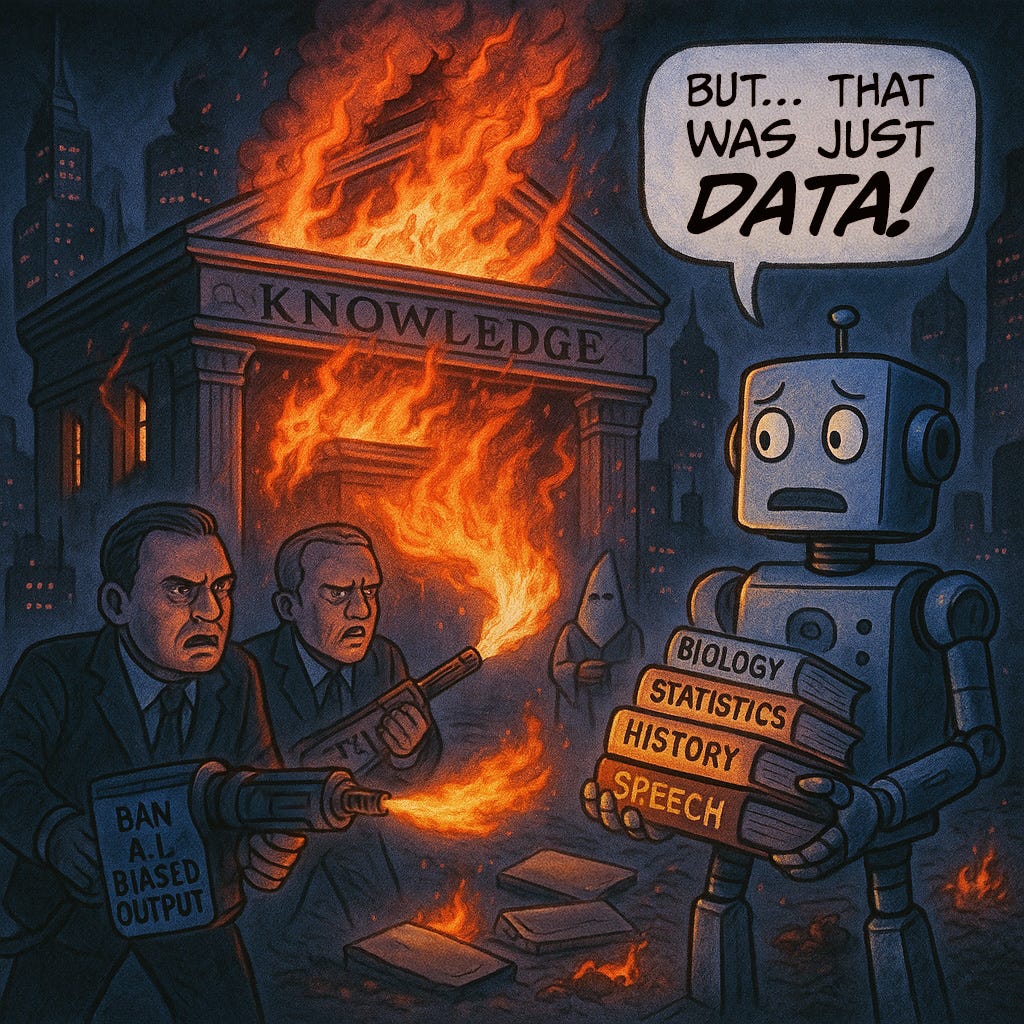FIRE files suit in PA, White House unveils AI EOs, SCOTUS rules on TikTok, & more!
Bringing you the latest free speech news (7/27/25)
Stories of the week
On March 26, 2024, Phil went to the Hamilton Street police station, where he stood on a public sidewalk and recorded what he could see in plain view. Approximately 15 minutes after he arrived, an officer approached him and briefly paused while looking at a “No Trespassing” sign. Phil responded, “Yeah, that’s a nice sign. Too bad it doesn’t apply to the public sidewalk.” The officer then silently walked away from Phil into the depths of the garage and up a vehicle ramp. Phil called out after him about his disregard of a sign next to the ramp that read: “PEDESTRIANS MUST USE STAIRS ONLY.”
I’ve mentioned this many times before on ERI and elsewhere: When it comes to AI regulations, we are talking about government intervention into how knowledge itself is created, in a technology that increasingly mediates — and is increasingly the source of — human understanding.
That should alarm anyone who values truth, intellectual humility, or the kind of open society we still aspire to be.
This week in ERI
This week in Expression
Smile for the surveillance state by Nora Mitchell
Turkish police arrested magazine staff over a Muhammad cartoon. But it doesn’t actually depict the prophet by Sarah McLaughlin
On June 30, Turkish police arrested four employees of satirical magazine LeMan on charges of “publicly demeaning religious values,” with one cartoonist also charged with “insulting the president.” They raided the magazine’s office as well and, two weeks later, arrested a LeMan editor at Istanbul’s airport upon his return from France. The arrests followed an attack on the LeMan office, with a mob breaking open windows and doors.
Free speech still reigns, but faces setbacks online by JT Morris
Don’t want to publish an opinion on your blog you disagree with? Too bad, the government forces you to publish it. Criticize the mayor? Go to jail — and good luck trying to sue the mayor for violating your First Amendment rights. Want to access online content legal for adults without jeopardizing your privacy and reputation? Think again, your state legislature demands you reveal your identity first.
This week on So to Speak
This week, So to Speak released the recording of former Congressman and current FIRE Advisory Council member Justin Amash in conversation with host and FIRE EVP Nico Perrino in front of an audience of 200+ high school students at FIRE’s Free Speech Forum at American University in Washington, DC.
This week in FIRE’s blog
The mercenary spyware industry is a menace to global free expression by Eli Kronenberg
FIRE statement on Columbia University's settlement with Trump administration
London Calling: Ronnie’s First Amendment Roundup
First Circuit gets (mostly) to the correct constitutional bottom line, but … by applying K-12 law to adult college students?
A confounding and frustrating circuit court decision takes center stage for a second week running. In Doe v. U. Mass, the school suspended a graduate student from his residence advisor role and later put him on “elevated probation” through graduation, with a permanent ban on living on-campus or even entering residence halls, after finding him “responsible” for “sexual misconduct” through speech and expressive conduct, which the First Circuit ultimately summarized as isolated “‘awkward’ comments, hugs, and a single incident of foot-touching” involving separate classmates. On Doe’s challenge to his punishment, the trial court entered judgment against him, holding he had no constitutional case. But the First Circuit reversed on the merits of Doe’s First Amendment claim. Which is good—but it did so exclusively by applying the Supreme Court’s cornerstone Tinker v. Des Moines School District decision involving public middle and high school students, and cases arising out of it like Mahanoy School District v. B.L., to the conduct of an adult college student. To be sure, the court correctly held Doe’s speech and expressive activity did not amount to the kind of “substantial disruption” (or allow a reasonable forecast of it) that allows public school K-12 administrators to regulate or punish student speech, and that he did not violate the rights of other students, the other ground on which K-12 admins can act. All well and good. But the standard for whether adult university student expression constitutes, say, punishable sexual harassment, must be that drawn from Davis v. Monroe County Board of Education, which reaches only conduct—including speech—“so severe, pervasive, and objectively offensive, and that so undermines and detracts from the victims’ educational experience, that the victim-students are effectively denied equal access to an institution’s resources and opportunities.” So, Doe gets the win on substance, but for the wrong reasons. (Of course, on the way out the door, the First Circuit also holds he can’t get damages, because his First Amendment right to speak as a college student in the manner he did ostensibly was not clearly established—but such are the vagaries of qualified immunity.) FIRE has long argued K-12 jurisprudence has no application in higher ed, and generally has been trying to keep the First Circuit on the right path, but, as elsewhere, the struggle continues.
Bonus case: Bates v. Pakseresht
In Bates v. Pakseresht, the Ninth Circuit held Oregon’s requirement that those applying to adopt children from foster care must agree to “respect, accept, and support” the children's sexual orientation, gender identity, and gender expression was unconstitutionally applied to deny an applicant who, based on sincerely held religious beliefs, objected to using such preferred pronouns or helping a child seek medical treatment for gender transition – that is in line with FIRE’s arguments as amicus that Oregon’s law compels speech in a viewpoint discriminatory way and is not the least restrictive means of safeguarding the welfare of LGBT children.
International free speech stories of the week
The Age-Checked Internet Has Arrived (Wired) by Matt Burgess & Lily Hay Newman
Ian Hislop calls arrest of man holding Private Eye cartoon at Gaza protest ‘mind-boggling’ (The Guardian) by Robyn Vinter
Koran-burner’s appeal to be decided by pro-free speech judge (The Telegraph) by Will Bolton
News in India is being erased from the internet (Index on Censorship) by Hanan Zaffar
Many reporters and editors based in India say media outlets are deliberately erasing or hiding their work amid what they describe as growing pressure from the Indian government to limit reporting critical of its policies. Stories that once documented surveillance, hate crimes and rights abuses are now vanishing from digital archives without explanation.
France launches criminal investigation into Musk’s X over algorithm manipulation (Politico) by Victor Goury-Laffont, Océane Herrero, Joshua Berlinger and Eliza Gkritsi
Interview of the week
Well this one was… different. Without knowing much about the topic, last Sunday I was invited onto ABC News presumably to talk about cancel culture, but when the interview started it turned out they wanted to talk about the Coldplay kiss-cam episode. I was very clear that the incident did not actually fit Rikki Schlott’s and my definition of “cancel culture” as stated in our book, The Canceling of the American Mind, but there were certainly aspects of it (online virality, social media mob, demands of accountability from unaffected bystanders, etc.) that echo the phenomenon. But, to be clear, more than anything I sympathize with the involved parties, particularly the families of the now ex-CEO & HR manager. You really can’t ever know the personal impact that public shaming has on individuals. For those interested, I recommend Jon Ronson’s 2016 book on the topic, So You’ve Been Publicly Shamed.






